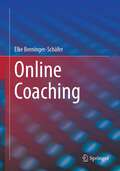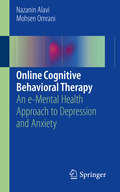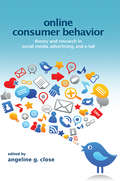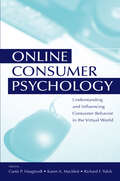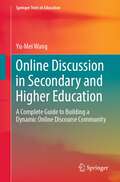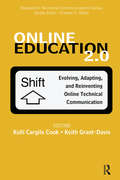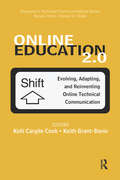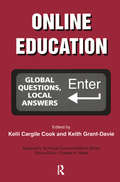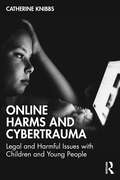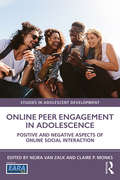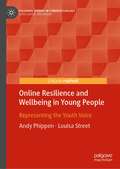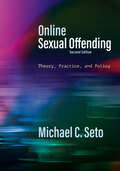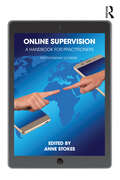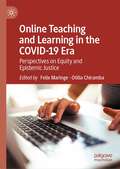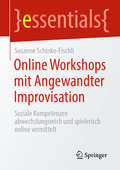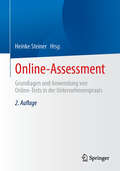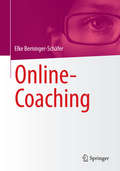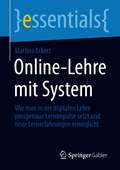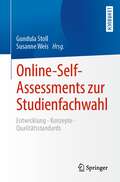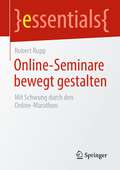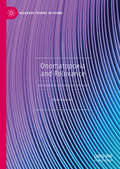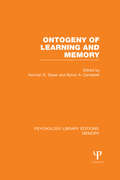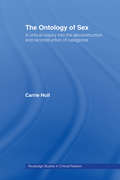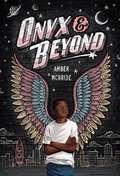- Table View
- List View
Online Coaching
by Elke Berninger-SchäferThis book gives an insight into virtual as well as multimedia possibilities for professional applications, scientifically based concepts, competence development and ethical guidelines. Case studies are used to illustrate the multimedia-based, virtual implementation of systemic solution-oriented support processes. The interweaving of virtual coaching with training modules takes into account the latest trends in continuing education. For this, provider platforms and tools must meet certain requirements to ensure safety and professionalism.
Online Cognitive Behavioral Therapy: An E-mental Health Approach to Depression and Anxiety
by Nazanin Alavi Mohsen OmraniThis book aims to provide the clinicians with details of online cognitive behavioral therapy (CBT) to facilitate care delivery for patients struggle with depression and anxiety. Chapters cover some of the most fundamental concepts for successful treatment, including experiments, action plans evidence, and the guidelines for managing, thoughts, feelings, and other key concerns. Designed to be a reader-friendly guide, each chapter opens with a summary of the content and a recap of concepts covered in previous sections, making this highly functional for individual chapter or whole book use. Each chapter also includes recommended tables and chart to facilitate the documentation of each recommended session, making this highly practical resource a vital tool for those who treat patients suffering from these particular mental health concerns.
Online Consumer Behavior: Theory and Research in Social Media, Advertising and E-tail (Marketing and Consumer Psychology Series)
by Angeline G. CloseSocial media (e.g., Facebook, LinkedIn, Groupon, Twitter) have changed the way consumers and advertisers behave. It is crucial to understand how consumers think, feel and act regarding social media, online advertising, and online shopping. Business practitioners, students and marketers are trying to understand online consumer experiences that help instill brand loyalty. This book is one of the first to present scholarly theory and research to help explain and predict online consumer behavior.
Online Consumer Psychology: Understanding and Influencing Consumer Behavior in the Virtual World
by Curtis P. Haugtvedt Karen A. Machleit Richard YalchOnline Consumer Psychology addresses many of the issues created by the Internet and goes beyond the topic of advertising and the Web to include topics such as customization, site design, word of mouth processes, and the study of consumer decision making while online. The theories and research methods help provide greater insight into the processes underlying consumer behavior in online environments. Broken into six sections, this book: focuses on community and looks at the Internet's ability to bring like-minded individuals from around the world into one forum; examines issues related to advertising, specifically click-through rates and advertising content placed within gaming online and wireless networks; provides readers with reasons why consumers customize products and the benefits of customization; discusses the psychological effects of site design; asks the question of whether the Internet empowers consumers to make better decisions; and discusses research tools that can be used online.
Online Discussion in Secondary and Higher Education: A Complete Guide to Building a Dynamic Online Discourse Community (Springer Texts in Education)
by Yu-Mei WangThis textbook covers the essentials for successfully conducting online discussions in various course delivery formats, such as online, face-to-face, and blended. Readers will learn how to design online discussions to cognitively engage students, build meaningful discourse communities to promote group dynamics, apply just-in-time facilitation strategies to deepen student learning and utilize robust assessment to ensure learning objectives are achieved. Online discussion is the lifeline of online learning and it is a pedagogical imperative that instructors have requisite skills in leading online discussions if they are to teach online courses. Leading the online discussion is a huge task, involving a complex process and professionals must master a range of skills to successfully lead online discussion. This book takes a comprehensive and systematic approach to this topic and helps teachers to utilize online discussion to maximize student learning. It is full of ideas and strategies that can be applied immediately in various teaching contexts, and practitioners can replicate examples in teaching practices or mold the ideas and strategies to fit particular teaching contexts. This textbook appeals to readers with knowledge and skills at various levels. Those who are new to online discussion will appreciate the step-by-step guidance, whereas readers with some experience can pick up skills they need. This flexibility contributes to the ultimate goal of the book – unleashing the potential of online discussion to benefit student academic learning.
Online Education 2.0: Evolving, Adapting, and Reinventing Online Technical Communication (Baywood's Technical Communications Ser.)
by Kelli Cargile Cook Keith Grant-DavieFirst Published in 2017. Routledge is an imprint of Taylor and Francis, an Informa company.
Online Education 2.0: Evolving, Adapting, and Reinventing Online Technical Communication (Baywood's Technical Communications)
by Keith Grant-Davie Kelli Cargile CookThe collection asks how faculty, courses, and programmes have responded and adapted to changes in students' needs and abilities, to economic constraints, to new course management systems, and to Web 2.0 technologies such as social networking, virtual worlds, and mobile communication devices. Addressing these questions it includes contributing voices from a wide variety of post-secondary, from urban and rural institutions and from technological and career colleges.
Online Education: Global Questions, Local Answers (Baywood's Technical Communications)
by Kelli Cargile Cook Keith Grant-DavisIn "Online Education: Global Questions, Local Answers", 24 college educators focus on the most important questions to be addressed by all scholar-teachers and administrators committed to developing high-quality online education programs. We describe these questions as "global" because they transcend the particular situations of individual institutions. They are questions that everyone involved in online education needs to address: What are the issues to consider when first developing and then sustaining an online education program? How do we create interactive, pedagogically sound online courses and classroom communities? How should we monitor and assess the quality of online courses and programs? And how should recent developments and innovations in online education cause us to reexamine our roles and responsibilities as educators in technical communication?While these global questions affect all of us in one way or another, they demand different local answers, such as those presented by the contributors to this text. Readers will need to consider which of these local answers might apply to their own situations and how these answers might need to be adapted to reflect the particular needs of their own institutions.
Online Harms and Cybertrauma: Legal and Harmful Issues with Children and Young People
by Catherine KnibbsThis vital, sensitive guide explains the serious issues children face online and how they are impacted by them on a developmental, neurological, social, mental health and wellbeing level. Covering technologies used by children aged two through to adulthood, it offers parents and professionals clear, evidence-based information about online harms and their effects and what they can do to support their child should they see, hear or bear witness to these events online. Catherine Knibbs, specialist advisor in the field, explains the issues involved when using online platforms and devices in family, social and educational settings. Examined in as non-traumatising a way as possible, the book covers key topics including cyberbullying; cyberstalking; pornography; online grooming; sexting; live streaming; vigilantism; suicide and self-harm; trolling and e-harassment; bantz, doxing and social media hacking; dares, trends and life-threatening activities; information and misinformation; and psychological games. It also explores the complex overlap of offline and online worlds in children and young people’s lives. Offering guidance and proactive and reactive strategies based in neuroscience and child development, it reveals how e-safety is not one size fits all and must consider individual children’s and families’ vulnerabilities. Online Harms and Cybertrauma will equip professionals and parents with the knowledge to support their work and direct conversations about the online harms that children and young people face. It is essential reading for those training and working with children in psychological, educational and social work contexts, as well as parents, policy makers and those involved in development of online technologies.
Online Peer Engagement in Adolescence: Positive and Negative Aspects of Online Social Interaction (Studies in Adolescent Development)
by Nejra Van ZalkThis book provides an in-depth insight into what is currently known and relatively unknown about youths’ online peer engagement. It delivers state-of-the-art current reviews of the literature in the field, with a strong coverage of methodological issues in studying online friendships and an emphasis on moving towards a new, less dichotomic, view of online peer interaction in adolescence. With a focus on what spending time with online-exclusive peers entails – in terms of both potential positive as well as negative consequences for friendship quality, intimacy, and well-being – this book offers a more nuanced commentary on youths’ online peer engagement. Including coverage of the evolution of online friendships, cyberbullying, cyberdating, sexting, online abuse, smartphones, social networks, as well as their impact on adolescent social interaction online, Van Zalk and Monks consider implications for future research directions and practical applications. Online Peer Engagement in Adolescence is important reading for undergraduate and master students studying social and developmental psychology, education, relationships and health, as well as advanced researchers and academics working in these fields.
Online Resilience and Wellbeing in Young People: Representing the Youth Voice (Palgrave Studies in Cyberpsychology)
by Andy Phippen Louisa StreetThis book explores online resilience and safety from a new perspective, by drawing extensively upon the youth voice. While “online safety” as a concept has now existed for well over ten years, the majority of policy and narrative is driven by preventative and adultist views of ensuring safety from harm. Underpinned by extensive empirical work, this book argues that safety, or freedom from harm, is not an achievable goal and we should refocus upon harm reduction and risk mitigation. Fundamental to this argument is that the youth voice clearly states that they will not disclose, or ask adults for support, because they do not believe they will get help or worse, will be punished as a result of disclosure. The research shows that professionals often bring their own digital value biases into safeguarding decisions, and feel that they should be white knights to young people, rather than listening to them and supporting them in a non-judgemental way. The book will be of great value to researchers and students as well as practitioners, teachers and parents interested in digital resilience and safeguarding, internet security and youth online behaviour and wellbeing.
Online Sexual Offending: Theory, Practice, and Policy
by Michael C. SetoThis second edition takes a multidisciplinary and practical approach to online sexual offending, providing psychologists and other professionals with the knowledge to understand this issue and the tools to solve it. Clinical and forensic psychologist Michael C. Seto keeps readers up with this ever-evolving problem as technology advances and presents new risks, particularly for children and adolescents. He reviews updated research on topics like child pornography, sexting and other sexual content generated by minors, online sexual solicitation and trafficking, digital exhibitionism and voyeurism, AI-generated pornography, deepfakes, and virtual sex dolls. He also describes new and revised tools and guidelines for assessing and treating perpetrators—particularly those committing offenses involving children and adolescents—and preventive measures to help at-risk individuals and to guide parents, minors, and bystanders to protect children and adolescents online. In addition to empirical research on various types of online sexual offending, Seto explores what drives perpetrators to engage in these behaviors, focusing particularly on the motivation–facilitation model.
Online Supervision: A Handbook for Practitioners (Psychotherapy 2. 0 Ser.)
by Anne StokesAs online therapy becomes more mainstream, the importance of using a means of supervision which parallels this is increasingly being recognised by practitioners and the professional bodies. Very little has been written about this newly developing way of working, so this book is timely. Online Supervision: A Handbook for Practitioners covers a wide range of issues, from the practical aspects of how supervision happens, through research, legal and ethical issues to specific therapeutic settings and issues. Existing models of supervision are considered in the context of the online setting and new models which have been developed specifically for supervising online are explored.All chapters are authored by experienced online therapists and supervisors, who bring their considerable knowledge from their practice to illuminate this growing area of the profession. In many chapters, anonymised case examples illustrate the text, alongside reflective activities which readers can choose to undertake.While the book aims to develop the practice of online supervision of online therapists, it is recognised that there are circumstances which mean that some practitioners may choose to engage in online supervision of their face-to-face work. This is recognised and guidelines for offering and engaging in online supervision are discussed. Many practitioners begin to offer online supervision without specialised training and the final chapter centres on a discussion about the value and necessity of undertaking preparation for working in a new medium.Online Supervision: A Handbook for Practitioners will be highly readable and accessible to both experienced practitioners and newcomers to this field.
Online Teaching and Learning in the COVID-19 Era: Perspectives on Equity and Epistemic Justice
by Felix Maringe Otilia ChirambaThis book examines the ongoing changes initially caused by the COVID-19 pandemic and the future prospects of teaching and learning in higher education institutions. It focuses on the impact of online education on issues of learning equity and epistemic justice. The transition from traditional face-to-face teaching to remote learning has exacerbated existing inequalities in epistemological access among higher education students, despite the shortcomings of the former in this regard. The book features essays by African academics who reflect on the challenges of epistemological access during the sudden shift to hybrid, blended and remote teaching and learning. It specifically explores the question of equitable learning in diverse home contexts, drawing on both theoretical and empirical studies conducted by the authors in South African universities and the region. The chapters employ the conceptual framework of epistemic injustice to define and explore various forms of such injustice, providing a basis for analyzing the implications of the transition to online pedagogy.
Online Workshops mit Angewandter Improvisation: Soziale Kompetenzen abwechslungsreich und spielerisch online vermittelt (essentials)
by Susanne Schinko-FischliSusanne Schinko-Fischli beschreibt in diesem essential kompakt, wie sich über Onlinemedien soziale Kompetenzen interaktiv und spielerisch mit Methoden der Angewandten Improvisation vermitteln lassen. Verbundenheit, Vertrauen und Offenheit können zum Beispiel online aufgebaut werden, um echte Teamarbeit zu ermöglichen. Storytelling-Formate eignen sich ausgezeichnet, um Wissen spannend und abwechslungsreich zu transportieren. Statusspiele wiederum sind auch online ein nicht zu unterschätzendes Phänomen, selbst wenn bestimmte Möglichkeiten der Darstellung fehlen. Das eigene Statusverhalten an die jeweilige Situation anpassen zu können, ist auch virtuell eine wichtige Grundlage für wirksame Kommunikation auf Augenhöhe.
Online-Assessment: Grundlagen und Anwendung von Online-Tests in der Unternehmenspraxis
by Heinke SteinerImmer mehr Unternehmen nutzen Online-Assessments, um Potenziale von Bewerbern oder Mitarbeitern via Internet zu testen. Online-Tests sind effizient und mittlerweile auch für mittelständische Unternehmen erschwinglich - doch sie haben auch ihre Grenzen. In diesem Buch zeigen erfahrene Personaler, was bei der Planung und dem Einsatz zu beachten ist und in welchen konkreten Bereichen Online-Tests sinnvoll eingesetzt werden können: Von der Vorselektion und dem Personalmarketing, über die Personalauswahl und -entwicklung, bis hin zu besonderen Einsatzgebieten wie Karriereberatung und Erfassung interkultureller Kompetenzen. Diese Darstellung wird eingerahmt von wissenschaftlichen und technischen Grundlagen sowie einem Überblick über neueste Entwicklungen und Trends. Fallbeispiele aus führenden Unternehmen, Checklisten zu Erfolgskriterien sowie eine kommentierte Übersicht über Anbieter von Online-Tests machen dieses Buch zu einem unverzichtbaren Leitfaden für alle, die Online-Assessments einsetzen möchten, aber auch für jene, die sich einen ersten Überblick über die Thematik verschaffen wollen.
Online-Aufstellungen: So funktionieren systemische Aufstellungen am Bildschirm (essentials)
by Stephanie Hartung Regina RemyMit Corona haben systemische Aufstellungen am Bildschirm einen regelrechten Boom erlebt. Nach dem Lockdown wurden innerhalb nur kurzer Zeit Online-Seminare und -Workshops sowie ganze Online-Ausbildungen angeboten bzw. durchgeführt. Wie ist es möglich, dass Aufstellungen am Bildschirm überhaupt funktionieren? Und was muss technisch und inhaltlich beachtet werden, damit sie erfolgreich ablaufen können? Welche Formen der Online-Aufstellungen gibt es, und welche Software Applikationen werden angeboten?Das Online-Aufstellungs-Essential gibt auf eben diese Fragen einfache und praxisorientierte Antworten.
Online-Coaching
by Peter Meyer Harald Geißler Elke Berninger-SchäferDieses Buch gibt einen Einblick in virtuelle sowie multimediale Möglichkeiten für professionelle Anwendungen, wissenschaftlich basierte Konzepte, Kompetenzentwicklung und Ethikrichtlinien. Anhand von Fallbeispielen wird die multimediale, virtuelle Durchführung von systemisch-lösungsorientierten Begleitprozessen dargestellt. Die Verschränkung virtuellen Coachings mit Trainingsmodulen trägt neuesten Trends in der Weiterbildung Rechnung. Hierfür müssen Anbieterplattformen und Tools bestimmte Voraussetzungen erfüllen, um Sicherheit und Professionalität zu gewährleisten.
Online-Lehre mit System: Wie man in der digitalen Lehre passgenaue Lernimpulse setzt und neue Lernerfahrungen ermöglicht (essentials)
by Martina EckertDieses Buch zeigt, wie eine gelungenen Online-Lehre an Hochschulen mit dem Lernzyklus-Modell von David Kolb aufgebaut und durchgeführt werden kann. Zu Beginn der Corona-Krise 2020 mussten Lehrkräfte an Hochschulen und in der Fort- und Weiterbildung sehr schnell von der Präsenzlehre auf Online-Lehre umschwenken. Nicht nur die technischen Herausforderungen waren zu bewältigen. Durch den veränderten Zugang waren didaktische Hürden zu nehmen und Lernende auf Distanz zu motivieren, zu instruieren und Lernprozesse zu steuern. In solchen radikalen Veränderungs-Situationen ist man auf Beispiele und Modelle angewiesen. Will man sich nicht in Versuch und Irrtum verschleißen, braucht man einen Orientierungsrahmen – ein Design. David Kolb hat in den 1970er Jahren bereits seinen Lernzyklus zum Erfahrungslernen vorgelegt. Er eignet sich hervorragend um zu verstehen: welche Lernschritte vollzogen werden müssen, damit Studierende Wissen erwerben und den Lerntransfer leisten können,welche unterschiedlichen Lernbedürfnisse und Lernstile Studierende haben und wie man diese motivierend bedient,wie man Lehrmaterialien und Instruktionen am besten gestaltet, um als Lehrende/r eine möglichst nachhaltige und ganzheitliche Lernerfahrung zu initiieren,welche Entlastungen sich mittelfristig in der Lehre durch Teil-Automatisierung in digitalen Lehrformen ergeben.Mit den neuen digitalen Möglichkeiten eröffnen sich jetzt neue und spannende Perspektiven in der Lehre. Dieses Buch gibt praxiserprobte Tipps, diese Chancen zu nutzen.
Online-Self-Assessments zur Studienfachwahl: Entwicklung - Konzepte - Qualitätsstandards
by Gundula Stoll Susanne WeisDieses Buch befasst sich praxisnah mit Online Self-Assessments (OSA), die an Hochschulen zur Unterstützung der Studienfachwahl eingesetzt werden. Es beschreibt die einzelnen Schritte im Prozess der OSA-Entwicklung – von der Auftragsklärung über die Identifikation von Anforderungen, Erfolgskriterien und relevanten Personenmerkmalen, die Konzeption der einzelnen OSA-Elemente und ihre technische Umsetzung, bis hin zur Evaluation.Für jeden Entwicklungsschritt werden konzeptuelle und methodische Grundlagen vermittelt, potenzielle Stolpersteine aufgezeigt, Qualitätsstandards abgeleitet, sowie Praxisbeispiele und Checklisten bereitgestellt.Dieses Buch ist ein Gemeinschaftswerk des Netzwerks Online Self-Assessment (NOSA).
Online-Seminare bewegt gestalten: Mit Schwung durch den Online-Marathon (essentials)
by Robert RuppIn digitalen Lernformaten dominiert eine sitzende Lern- und Arbeitshaltung vor dem Bildschirm. Dies hat nicht nur schnelle Ermüdung, inneres Abschalten und Konzentrationsprobleme zur Folge - die langen Sitzzeiten führen auch zu einem Gesundheitsrisiko. Dieses essential zeigt die Gefahren des übermäßigen Sitzens. Basierend auf aktuellen Erkenntnissen der Gesundheits- und Lernforschung wird ein aktivierender Ansatz vorgestellt, der mit ganz einfachen kleinen Maßnahmen für mehr körperliche Bewegung und Sitzunterbrechungen in Online-Seminaren sorgt. Online-Seminare werden lebendiger, kurzweiliger und produktiver. Jede Mikrobewegung ist ein kleiner gesundheitsfördernder Beitrag für Lernende und Lehrende. Das essential enthält praxisanregende Empfehlungen sowie konkrete, einfach anwendbare Methoden aus der digitalen Lehrpraxis.
Onomatopoeia and Relevance: Communication of Impressions via Sound (Palgrave Studies in Sound)
by Ryoko SasamotoThis book aims to provide an account of both what and how onomatopoeia communicate by applying ideas from the relevance theoretic framework of utterance interpretation. It focuses on two main aspects of the topic: the contribution that onomatopoeia make to communication and the nature of multimodal communication. This is applied in three domains (food discourse, visual culture in Asia and translation) in the final sections of the book. It will be of interest to scholars working in the fields of pragmatics, semantics, cognitive linguistics, stylistics, philosophy of language, literature, translation, and Asian studies.
Ontogeny of Learning and Memory (Psychology Library Editions: Memory)
by Norman E. Spear Byron A. CampbellOriginally published in 1979, this volume contains chapters prepared following a conference at SUNY- Binghamton in 1977. The conference was the outcome of exciting new developments that had occurred in the ontogeny of learning and memory at the time, as well as a long-standing friendship between the editors. Many changes had taken place in the years leading up to this volume and there were now many more researchers active in the field. This volume reflected the rapidly changing state of this research area at the time and includes early contributions from researchers now well established in the field.
Ontology of Sex: A Critical Inquiry Into The Deconstruction And Reconstruction Of Categories (Routledge Studies in Critical Realism)
by Carrie HullPoststructuralism, particularly through the writings of Michel Foucault and Judith Butler, has achieved remarkable success in challenging our belief in natural sex categories and instincts. Here, Carrie Hull endorses the progressive ideals of poststructuralism while demonstrating the superiority of a realist account of sex and sexuality. Embracing biological and cultural variability, Hull nonetheless shows that the sexed body is naturally structured and deeply meaningful. Poststructuralist philosophers have argued that biological sex is a continuum rather than a binary, and that sex identity and drive are entirely performances of cultural norms rather than expressions of innate qualities. Hull draws parallels with Nelson Goodman, W.V.O. Quine, and B.F. Skinner to show that these poststructuralist theories are rooted in a nominalist, relativist, and behaviourist philosophy, and develops an alternative framework using arguments from contemporary and critical realism. Employing colourful illustrations from biology, anthropology and psychology, Hull demonstrates the rich potential of realist philosophy, and concludes that it is philosophically and scientifically correct, on one hand, and politically advisable, on the other, to maintain a distinction - albeit attenuated - between sex and gender, and sexuality and behaviour.
Onyx & Beyond
by Amber McBridePraised as "a story of perserverance and love" in a starred review by Kirkus, here is a story about keeping dreams alive.Onyx lives with his mother, who is showing signs of early-onset dementia. He doesn't want to bring attention to his home -- if Child Protective Services finds out, they'll put him into foster care.As he's trying to keep his life together, the Civil Rights Movement is accelerating. Is there anywhere that's safe for a young Black boy? Maybe, if only Onyx can fulfill his dream of becoming an astronaut and exploring space, where none of these challenges will follow him. In the meantime, Onyx can dream. And try to get his mom the help she needs.Based on her own father's story of growing up in the 1960s and facing the same challenge with his own mother, award winner Amber McBride delivers another affecting depiction of being young and Black in America.
